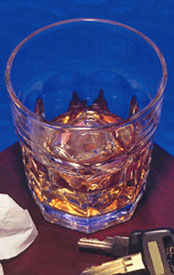Breath-Alcohol Odor

It is doubtful that there will ever be a drunk driving case in which the officer is not prepared to testify that the defendant had "an odor of alcohol" on his breath (breath-alcohol). If the arrest report does not indicate such an odor, then the individual will undoubtedly be booked for and subsequently charged with, driving under the influence of drugs. Quite simply, alcohol on the breath is the one observation that will always be encountered in the DUI case.
It is also one of the more damaging. Unless the odor can be explained or minimized, the jury will inevitably conclude that "where there's smoke, there's fire": alcohol on the breath means alcohol in the body and that means a drunk driver.
There are two effective courses of attack:
- question the source of the smell
- question the conclusion of intoxication (or question both)
The important point to be noted is that alcohol has little or no odor. The officer is not smelling an "odor of alcohol" on the client's breath, but rather the odor of the flavoring of the drink (scotch, beer, gin, wine). The odor of the flavoring can be deceptive as to both the strength of the drink and the amount consumed. Beer and wine, for example, will leave the strongest "odor of alcohol" on the breath, yet they are the least intoxicating of beverages. A single can of beer can leave a stronger odor than three or four martinis.
One very effective way of illustrating the point that ethanol (alcohol) has no odor is the consumption of near beer. Near beer is a nonalcoholic beverage made from grain, malt, hops and yeast and which looks, smells and tastes like regular beer. What is the effect? The person drinking near beer will have "an odor of alcohol" on his breath, despite having consumed no alcohol at all!
What is the point of all this? The point is simply that since the intoxicating element, alcohol, has no odor, the presence of an odor tells us only that a beverage normally associated with the presence of alcohol has been consumed in the relatively recent past. More important, it does not tell us how much alcohol has been consumed. There is no correlation between the amount of alcohol consumed and the odor, and certainly none between the amount and the strength of the odor. Again, beer is among the least intoxicating of beverages and yet leaves a strong odor on the breath.
Alcohol on the Breath: Evidence of DUI?
Discussion by a prominent California DUI lawyer of the officer's observation of odor of alcohol on the breath.